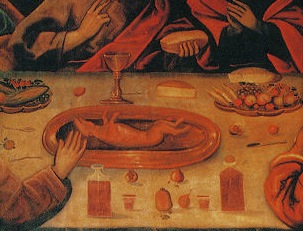Lately, we have been discussing Rabbi Shmuley Boteach’s new book, “Kosher Jesus.” We also questioned whether Jesus really was kosher – meaning, did Jesus keep kosher? I have always understood that although Jesus was something of a renegade rabbi, he still followed the laws. That would mean that he did indeed keep kosher. I don’t know if that means you could call him a “kosher Jesus” – maybe he was more of a “Jesus kosher!”
Something I have always found interesting is the concept of the “Last Supper.” From everything I have learned (and I did go to a Christian school before I became religious, so I learned something there!), Jesus did keep kosher. I also learned that the Last Supper was really a Passover meal. In fact, having done some research into it, it does appear that the Hebrew dates for when Jesus died indicate that his last meal would have been a Passover seder.
Because Jesus and his disciples kept kosher, he would have also followed all the laws of the Passover seder. He would have eaten matzah and drunk wine. He would not have had any bread. I know there are many paintings of the “Last Supper” out there and some seem to show him eating matzah while others show him eating bread.

Detail of the Last Supper painting in Peru, showing Jesus eating bread, guinea pig, and drinking chicha (corn liquor)
When Rabbi Ben and I were in Peru, we walked past the area there that houses the famous cathedral. Inside the cathedral is a famous painting of Jesus’s last supper. This is a South American version and in it Jesus is definitely not kosher! It shows Jesus eating a meal of bread and guinea pig, and drinking chicha (a kind of corn liquor). All of these foods are very popular in Peru. However, at the real “last supper,” “kosher Jesus” would certainly not have eaten any of these things! He would have had matzah instead of bread, lamb instead of guinea pig (which is not a kosher animal, ever!), and wine instead of corn liquor. (Just as an aside, it looks to me like he also has some local cheese on the table – and kosher Jesus would never have had cheese and meat on the same table at the same time and eaten them at the same meal!)
This just goes to show that how people interpret Jesus and his actions varies from culture to culture and place to place. People want to feel “closer” to him, so they decide that he did the same kind of thing they would do. It is very interesting to see that in Peru, people think Jesus would have been eating the same things as them, which guinea pig wasn’t even available in Israel at the time!
At any rate, Jesus probably did keep kosher, so this painting (and many other of the “Last Supper” paintings out there) are woefully inaccurate.
2 Responses to “Was Jesus kosher? What did “kosher Jesus” eat at the Last Supper? Jesus kept Kosher even then!”






This is such a humorous, yet sobering example, of how the teachings of Moses has relevance for all peoples today! And how so many are ignorant of that, in spite of thousands of years of knowledge by a few.
I certainly wish that I had realized the importance of having seasons of being yeast free from time to time before before yeast fungus ruined my health. I have found that living “kosher” to the best of my ability (in a non-kosher community) has brought me better health and made me more spiritually minded.
We advocate in our faith community eating according to what is written, and see dramatic heath changes. We moved to be near a raw dairy and chemical free farms, because “He shall eat curds and honey when he knows how to refuse the evil and choose the good…” only works with a clean food supply.
I can’t imagine doing what you are doing – even on short road trips, I starve because there is so little “food” to eat on the way!
Kosher Jesus. Makes sense. Did you know that from what he said and believed, he may have been a Pharisee, IF he did indeed uphold the Oral law and Torah.